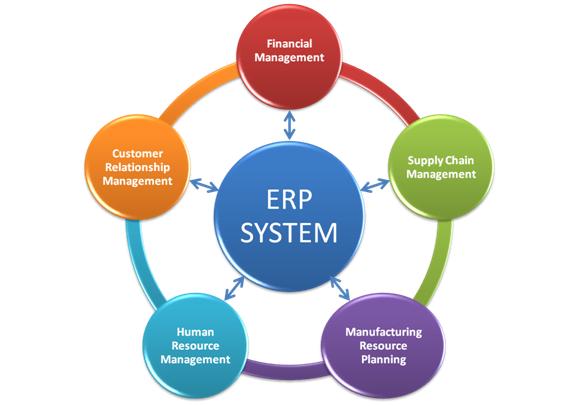Human Resource Management Systems (HRMS, EHRMS), Human Resource Information Systems (HRIS), HR Technology or also called HR modules, shape an intersection in between human resource management (HRM) and information technology. It merges HRM as a discipline and in particular its basic HR activities and processes with the information technology field, whereas the planning and programming of data processing systems evolved into standardized routines and packages of enterprise resource planning (ERP) software. On the whole, these ERP systems have their origin on software that integrates information from different applications into one universal database. The linkage of its financial and human resource modules through one database is the most important distinction to the individually and proprietary developed predecessors, which makes this software application both rigid and flexible.… Read the rest
Management Information Systems
Business benefits of ERP systems
Recommended reading: Enterprise Resource Planning (ERP) Definition
Installing an ERP (Enterprise Resource Planning) system has many advantages -both direct and indirect. The direct advantages include improved efficiency, information integration for better decision making, faster response time to customer queries, etc. The indirect benefits include better corporate image, improved customer goodwill, customer satisfaction, and so on.
The following are some of the direct benefits of an ERP system:
- Business Integration
- Flexibility
- Better Analysis and Planning Capabilities
- Use of Latest Technology.
Business Integration: The first and most important advantage lies in the promotion of integration. The reason why ERP packages are considered to the integrated, is the automatic data updating (automatic data exchange among applications) that is possible among the related business components.… Read the rest
Logistic information system and it’s objectives
Logistic information system is nothing but a part of Management Information System to manage, control and measure the logistical activities. These activities occur within the organization or as well as overall across the supply chain.
Logistics information systems are important for achieving logistics efficiency and effectiveness. In an enterprise, logistics information system seeks to achieve the following:
- It ensures of logistics functional operations into a process pursuing customer satisfaction at the lowest total cost.
- Information system facilitates planning and control of the logistical activities related to order fulfillment.
- It makes the firm more competitive, by making better tactical and strategic decision for the benefits of the firm and its customer.
Enterprise Resource Planning (ERP)
Enterprise Resource Planning (ERP) is defined as an Integrated Computer based planning technique used in Organizations and Enterprises for management and resource planning. Resources here mean both internal and external resources of an organization. Various resources of an organization can include financial resource, tangible resource, human resource and also various material requirements. ERP can also be defined as an application and software architecture that facilitates Information flows between various business functions inside and outside of an organization. It consolidates business environment into a uniform system environment. Basically what ERP systems do is that it integrates and automates processes within an entire organization regardless of the organization’s behavior.… Read the rest
Marketing Information Systems
Before we discuss about use of Management Information System in marketing we must first be familiar with the term ‘Management Information System’. It is defined as a system or process that provides the information necessary to manage an organization effectively. MIS and the information it generates are generally considered essential components of prudent and reasonable business decisions.
Management Information Systems are distinct from Regular information systems in that they are used to analyze other information systems applied in operational activities in the organization. Academically, the term is commonly used to refer to the group of information management methods tied to the automation or support of human decision making, e.g.… Read the rest
The Focus of Business Process Reengineering (BPR) on the Current Issues in Business
The existing system in the organization is totally reexamined and radically modified for incorporating the latest technology. This process of change for the betterment of the organization is called as Business process reengineering. With Business process being reengineered, the organizations have to change the workflow and business procedures for efficiency in the organization. Latest software are used and accordingly the business procedures are modified, so that documents are worked upon more easily and efficiently. This is called as workflow management.
Business process reengineering is a major innovation changing the way organizations conduct their business. Such changes are often necessary for profitability or even survival.… Read the rest



